Add this eBook to your basket to receive access to all 725 records. Our indexes include entries for the spelling rawlins. In the period you have requested, we have the following 725 records (displaying 561 to 570): These sample scans are from the original record. You will get scans of the full pages or articles where the surname you searched for has been found. Your web browser may prevent the sample windows from opening; in this case please change your browser settings to allow pop-up windows from this site. Boys entering Clifton College
(1867)
Clifton College near Bristol was established in 1862. This edition of the Clifton College Annals and Register for the Old Cliftonian Society by F. Borwick was published in 1925. Boys are listed alphabetically by term of entry, with full names, surname first, in bold. Father's (or widowed mother's) name is given (surname and initials) in capitals, and address. Then there is the name of the house (N. T., North Town; S. H., School House; S. T., South Town), first and last forms, distinctions in school work and games, and month of leaving. Where known, the editor then gave a career summary with month of death; or, if still living, address as in 1925 (in italics). | Sample scan, click to enlarge
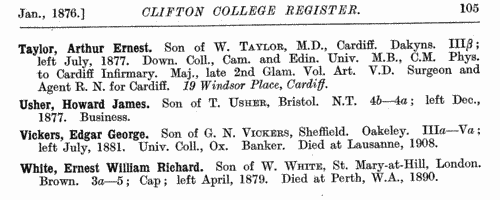
| Classics students at Cambridge University
(1868)
Tripos lists or examination results for the year, arranged by class (First, Second and Third), and within each class in order of score in the examination (students getting exactly equal marks are bracketed together). Each student's surname and college is given: this list was printed in 1890, and was annotated with asterisks to show which students had subsequently become fellows of the university; and with footnotes showing those who became headmasters, &c., elsewhere. In each year two students were singled out for the Chancellor's Medals, and these are marked, (A) for senior, (B) for junior (or with a paragraph mark if adjudged of equal merit). These lists are particularly useful in identifying for an individual the fellow-students who will have attended lectures with him; and, where from the college, are likely to have been even more closely associated by having been under the same supervisor. (The sample scan is from the start of the Mathematics Tripos list for 1770) | Sample scan, click to enlarge

| Dublin University Electors
(1868)
The roll of all persons entitled to vote at elections for members to serve in Parliament for the University of Dublin lists living graduates of the university, arranged alphabetically by surname and christian name(s), with current residence, dates at which their degrees were conferred - Vern. denoting the Spring, Aest. the Summer, and Hiem. the Winter Commencements - and date of registration. Members of the Senate and electors on the books of Trinity College are distinguished by a dagger. Where an elector's name is given in italics, he was no longer known at the residence given. | Sample scan, click to enlarge

| Electors for Leamington Priors
(1868)
A poll for the election of two knights of the shire to represent South Warwickshire was held 24 November 1868: the candidates were Lord Hyde (H.), Sir R. N. C. Hamilton (H.), H. C. Wise, Esq. (W.) and John Hardy, Esq. (H.). This poll book lists all those electors who voted; the county franchise included not only male freeholders of 40s a year, but also £10 copyholders and long-leaseholders, and £50 short-leaseholders and tenants. In addition, where no vote was cast the elector's number and name are given, the name in italics. The names are arranged by polling district and then by parish or township. Freeholders holding requisite property in a district are listed there, but might well reside elsewhere. The right-hand column indicates how each man voted. | Sample scan, click to enlarge
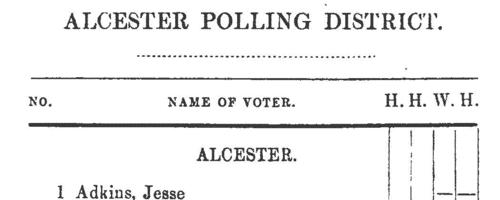
| Electors for Wasperton
(1868)
A poll for the election of two knights of the shire to represent South Warwickshire was held 24 November 1868: the candidates were Lord Hyde (H.), Sir R. N. C. Hamilton (H.), H. C. Wise, Esq. (W.) and John Hardy, Esq. (H.). This poll book lists all those electors who voted; the county franchise included not only male freeholders of 40s a year, but also £10 copyholders and long-leaseholders, and £50 short-leaseholders and tenants. In addition, where no vote was cast the elector's number and name are given, the name in italics. The names are arranged by polling district and then by parish or township. Freeholders holding requisite property in a district are listed there, but might well reside elsewhere. The right-hand column indicates how each man voted. | Sample scan, click to enlarge
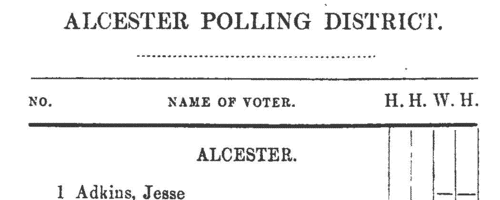
| Oxford Voters: St Giles
(1868)
The poll of the freemen and electors of the City of Oxford was taken 17 November 1868, the candidates being the Rt Hon Edward Cardwell (C), William Vernon Harcourt esq., Q.C. (H), and James Parker Deane, Esq., Q.C., D.C.L. (D). This poll book, published by the Oxford Chronicle, lists all the voters alphabetically by parish or township, freemen's names being preceded by an asterisk. Postal addresses are given, including street numbers, and in the case of freemen occupation is usually given. Lodgers are listed separately at the end of each section. The areas covered are: All Saints, St Aldate, Binsey, St Clement, Cowley, St Ebbe, St Giles, Headington, North Hincksey, South Hincksey, Holywell, Iffley, St John, St Martin, St Mary Magdalen, St Mary the Virgin, St Michael, St Peter in the East, St Peter le Bailey, and St Thomas; and there is also a list of Out of Town (non-resident) freemen who voted. | Sample scan, click to enlarge
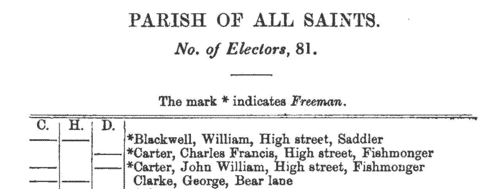
| Oxford Voters: St Thomas
(1868)
The poll of the freemen and electors of the City of Oxford was taken 17 November 1868, the candidates being the Rt Hon Edward Cardwell (C), William Vernon Harcourt esq., Q.C. (H), and James Parker Deane, Esq., Q.C., D.C.L. (D). This poll book, published by the Oxford Chronicle, lists all the voters alphabetically by parish or township, freemen's names being preceded by an asterisk. Postal addresses are given, including street numbers, and in the case of freemen occupation is usually given. Lodgers are listed separately at the end of each section. The areas covered are: All Saints, St Aldate, Binsey, St Clement, Cowley, St Ebbe, St Giles, Headington, North Hincksey, South Hincksey, Holywell, Iffley, St John, St Martin, St Mary Magdalen, St Mary the Virgin, St Michael, St Peter in the East, St Peter le Bailey, and St Thomas; and there is also a list of Out of Town (non-resident) freemen who voted. | Sample scan, click to enlarge
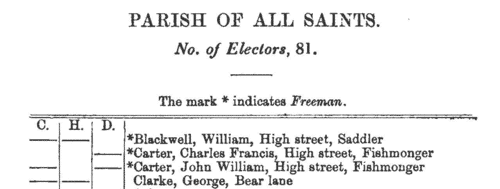
| Patentees of New Inventions
(1868)
Abstracts of British patents for new inventions applied for and granted from 1 January to 31 December 1868: giving date, name and address, and short description of the invention. It is then stated whether 'Letters patent sealed' or 'Provisional protection only'. | Sample scan, click to enlarge

| Boys entering Cheltenham College
(1869)
Cheltenham College 'was founded in order to provide for the sons of gentlemen a Classical, Mathematical, and General Education of the highest order, on moderate terms, in strict conformity with the principles and doctrines of the Church of England.'
Andrew Alexander Hunter, the college registrar, compiled the first edition of the College Register in four parts from 1883 to 1886: these merely listed the boys by term of entry, with their dates of birth and names and addresses of their fathers. Circulars were also sent out to all Old Cheltonians whose addresses were known, requesting additional details. On the basis of the returns from these and Hunter's further researches, this much fuller register was published in 1890.
The information after each boy's name is given (where known and applicable) in this format: father's full name and address as of the time the boy entered the college; class and department on entering the college (classes being number from 1 downwards, and these again divided into A and B, some into C and D, others into P (Principal's side) and V. P. (Vice-Principal's side) - 1A was the highest class in each department: besides this, certain others were called Addiscombe, Woolwich, Civil, Direct, Line, Sandhurst, Naval, Special, Preparatory, Latin, and India Civil) and the same on leaving, name of Boarding House (or 'Day Boy'), scholastic and athletic honours attained at the college, and subsequent career (including date and place of death, or present address in 1890, if known). | Sample scan, click to enlarge
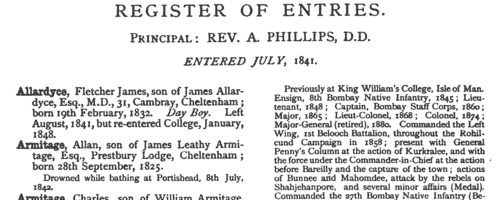
| Deaths
(1869)
Deaths reported in the Pall Mall Gazette, May 1869 | Sample scan, click to enlarge

|
Research your ancestry, family history, genealogy and one-name study by direct access to original records and archives indexed by surname.
|











